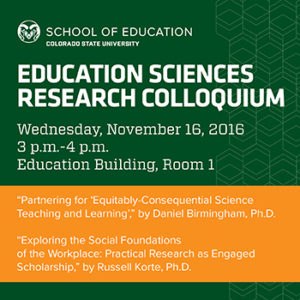On Wednesday, Nov. 16, the School of Education’s Education Sciences specialization will host the second installment of its research colloquium series. The series is intended to offer a glimpse of current research and other topics from the Education Sciences faculty; the events are free and open to the public.
Session One: A recap
The first colloquium session featured two research presentations from three School of Education faculty members who teach in the Education Sciences specialization. Affiliate Associate Professor Krisztián Jósza discussed his research with “Computer-Based Tasks of Mastery Motivation and Executive Functions for School Readiness in 3-to-8-Year-Old Children,” and his goal to develop improvement programs for disadvantaged youth. Assistant Professors Cerissa Stevenson and Andrea Weinberg provided a look at their work with “A Quasi-Experimental Examination of an Innovative Professional Development School Model,” and their aim to tighten K-2 curriculum and improve teacher candidate approaches to teaching.
 The colloquium series offers an opportunity to take a closer look at the research currently being conducted by Education Sciences professors, providing insight into this field of study and showing the impact the research is making on the world around us. Chris Schaumberg, a graduate student in the Education Sciences specialization, said of the first colloquium event, “It was intrinsically valuable to see my professor [Dr. Jósza] present his ongoing research in the field.”
The colloquium series offers an opportunity to take a closer look at the research currently being conducted by Education Sciences professors, providing insight into this field of study and showing the impact the research is making on the world around us. Chris Schaumberg, a graduate student in the Education Sciences specialization, said of the first colloquium event, “It was intrinsically valuable to see my professor [Dr. Jósza] present his ongoing research in the field.”
Session Two: A preview
With the series off to a strong start, the School of Education encourages students and faculty within the school and across campus to attend upcoming sessions. The next session takes place on Wednesday, Nov. 16, 3 p.m.-4 p.m. in Room 1 of the Education Building, and features presentations by Assistant Professor Daniel Birmingham and Associate Professor Russell Korte.
“Partnering for ‘Equitably-Consequential Science Teaching and Learning’,” by Daniel Birmingham, Ph.D.
Abstract: Despite multiple national reform efforts in the United States, achievement and interest gaps continue to persist in school science, disproportionately impacting youth from traditionally marginalized communities. A growing body of research suggests that many youth, both females and males, from marginalized communities who have not traditionally fared well or been interested in school science are excelling in informal learning settings in both knowledge gains and increasing interest in science (Deschenes & Malone, 2010). Yet, little is known about how school science teachers might build upon these out of school successes.
This study focuses on supporting teachers in learning about and enacting “equitably-consequential teaching and learning” as one way to bridge the informal/formal divide. I use the term “equitably-consequential” to call attention to how learning in science is a) rooted in the history and geographies of young people’s lives in ways that b) value the connections they make among science, community and broader social issues in pursuit of c) transformative outcomes, such as action taking and shifting power dynamics.
Bio: Daniel Birmingham is an assistant professor of STEM Education in the School of Education at Colorado State University. His research uses critical and sociocultural lenses to examine potential avenues to bridge community and school experiences in order to alter modes participation in STEM and support transformative learning for youth from traditionally marginalized communities.
“Exploring the Social Foundations of the Workplace: Practical Research as Engaged Scholarship,” by Russell Korte, Ph.D.
Abstract: The focus of my work is on the social systems in the workplace that govern how professionals think and act in the course of their work. This emphasis on the social systems is in contrast to and expands upon the technical aspects of professional work that dominate how people perceive their work. The studies reported in this session include engineering students, faculty, practicing engineers and medical students reporting their experiences socializing into their new roles as they transition into, through, and out of their schooling.
The overriding concern with my research agenda is to make it practical, that is to conduct scholarly research in collaboration with practitioners to effect tangible change for people and their organizations. This objective requires that the studies are grounded in organizational contexts attending to the idiosyncrasies of particular settings and stakeholders.
Bio: Russell Korte is an Associate Professor of Organizational Learning, Performance, and Change in the School of Education at Colorado State University. Korte studies the socio-cultural systems in organizations and their effects on learning and performance in school and the workplace. This work focuses on engineering students, faculty, practicing engineers, medical students and teachers.
Prior to Colorado, Korte was at the University of Illinois at Urbana-Champaign, where he helped redesign the first year engineering program as a Fellow with the Illinois Foundry for Innovation in Engineering Education, and was a member of the Academy for Excellence in Engineering Education—faculty development program at the University of Illinois. Earlier, he was a research assistant for the Center for the Advancement of Engineering Education at the University of Washington. Additional research interests include theory, philosophy, social science, workplace learning and performance, socialization, professional education and organization studies.
Future Sessions: Spring 2017
Additional colloquium sessions are scheduled for Feb. 15 and April 19. For up-to-date information on School of Education events, visit the school’s Facebook page.